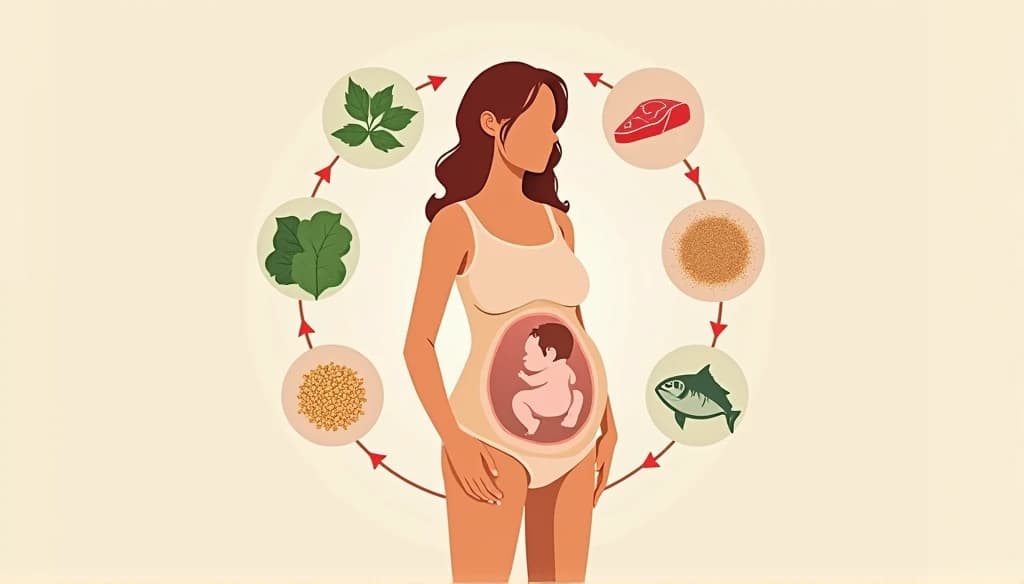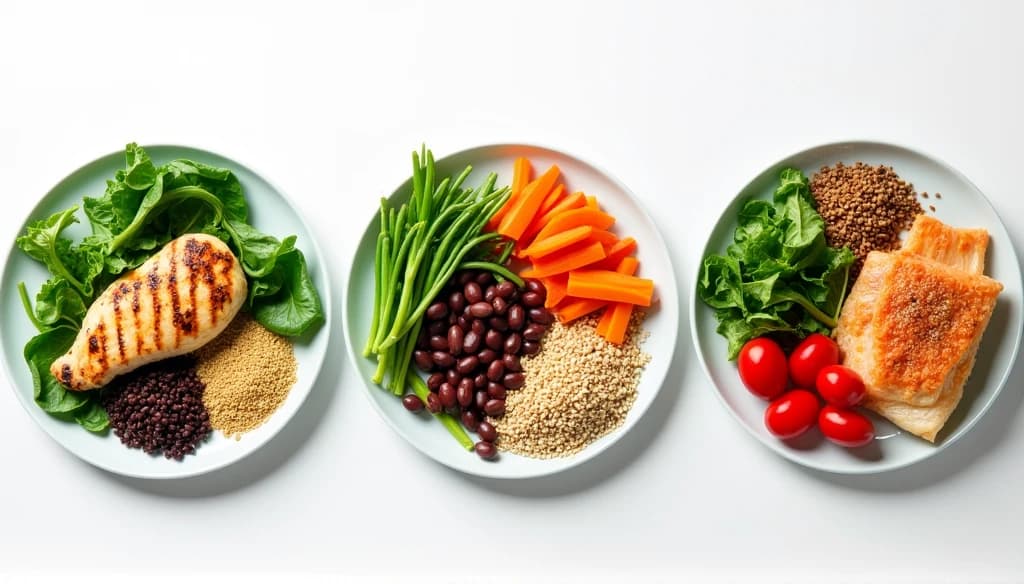Table of Contents
TogglePicture this: You’ve been following the keto diet for months, feeling energized and perhaps even shedding a few pounds. Then, you find out you’re pregnant. A wave of uncertainty hits you—are keto and pregnancy compatible? Is it safe for both you and your baby to continue this low-carb, high-fat lifestyle? This confusing situation leaves many mothers-to-be searching for answers.
In this article, we’ll dive deep into the latest research on the ketogenic diet during pregnancy, explore the potential risks and benefits, and provide practical tips for making informed nutritional choices. Whether you’re committed to keto or just curious, we’ve got you covered.
What Is the Keto Diet?
The ketogenic diet, commonly known as keto, is a high-fat, low-carbohydrate eating plan designed to shift the body’s primary energy source from carbohydrates to fat. By significantly reducing carbohydrate intake and increasing fat consumption, the body enters a metabolic state called ketosis, where fat is burned for fuel instead of glucose.
Typical macronutrient breakdown on a keto diet:
- Fat: 70-75%
- Protein: 20-25%
- Carbohydrates: 5-10%
This diet has gained widespread popularity for its potential benefits in weight loss, improved focus, and managing conditions like epilepsy. However, pregnancy brings different nutritional needs, leading many to question whether keto is appropriate during this life stage.
The Nutritional Needs of Pregnancy

During pregnancy, your body’s requirements for certain nutrients increase to support fetal development and your own health. Some key nutrients that are crucial during pregnancy include:
- Folate/Folic Acid: Essential for preventing neural tube defects.
- Iron: Supports increased blood volume and oxygen transport.
- Calcium: Necessary for fetal bone and teeth development.
- Omega-3 Fatty Acids: Important for brain development.
- Carbohydrates: Provide energy for both you and your growing baby.
A traditional keto diet, which restricts carbohydrates to minimal levels, may not provide sufficient amounts of some of these critical nutrients. Thus, it’s important to weigh the benefits and risks before continuing or starting a keto diet during pregnancy.
Can You Stay on Keto While Pregnant?

Potential Benefits of Keto During Pregnancy
Some proponents of the keto diet argue that certain aspects of keto can be beneficial during pregnancy, such as:
- Reduced Risk of Gestational Diabetes: By limiting carbohydrate intake, keto may help regulate blood sugar levels, potentially reducing the risk of gestational diabetes.
- Stable Energy Levels: High-fat meals may help prevent the blood sugar crashes that some pregnant women experience after eating high-carb foods.
- Weight Management: Some women may turn to keto to avoid excessive pregnancy weight gain, as it promotes fat burning over sugar storage.
That said, while these benefits may sound appealing, they must be weighed against the potential risks, especially considering that pregnancy is a time when your body needs a wide variety of nutrients.
Risks of Following Keto During Pregnancy
Despite the potential benefits, many experts warn against following a strict ketogenic diet during pregnancy due to several concerns:
- Nutrient Deficiency: A traditional keto diet can be low in essential nutrients like folate, calcium, magnesium, and fiber, all of which are vital for fetal development and maternal health.
- Developmental Concerns: Carbohydrates are important for fetal brain development. Severely limiting carbohydrate intake while pregnant could potentially impact your baby’s cognitive development.
- Keto Flu and Dehydration: The keto diet can lead to symptoms of “keto flu,” such as headaches, fatigue, and nausea. These symptoms could exacerbate common pregnancy discomforts and increase the risk of dehydration, which is already a concern during pregnancy.
- Lack of Long-Term Studies: There is a lack of comprehensive long-term studies on the effects of the keto diet during pregnancy. Most of the available research on keto focuses on epilepsy or weight loss, not pregnancy outcomes.
Keto vs. Other Pregnancy Diets: A Comparative Table
To help you better understand how keto stacks up against other common pregnancy diets, here’s a comparison table of key factors:
| Factor | Ketogenic Diet | Balanced Pregnancy Diet | Gestational Diabetes Diet | Mediterranean Diet |
|---|---|---|---|---|
| Carbohydrate Intake | Very low (5-10%) | Moderate (45-65%) | Low to moderate | Moderate (35-45%) |
| Fat Intake | High (70-75%) | Moderate (25-35%) | Moderate | High (35-40%) |
| Protein Intake | Moderate (20-25%) | Moderate | Moderate | Moderate |
| Main Focus | Ketosis (fat-burning) | Nutritional balance | Blood sugar control | Heart health, nutrient-dense foods |
| Risk of Nutrient Deficiency | High (without supplements) | Low (with variety) | Low | Low |
| Suitability for Pregnancy | Controversial, limited studies | Recommended | Recommended for managing diabetes | Recommended |
Alternative Low-Carb Approaches for Pregnancy

If you’re interested in lowering your carb intake but find the keto diet too restrictive for pregnancy, there are some safer alternatives to consider:
1. Modified Low-Carb Diet
A modified low-carb diet allows for a higher intake of carbohydrates (typically 80-150 grams per day) compared to keto. This can provide more flexibility in food choices while still promoting stable blood sugar levels. It’s a more balanced approach that can still be effective for managing weight and gestational diabetes without risking nutrient deficiencies.
2. Low-Glycemic Index Diet
A low-glycemic index (GI) diet focuses on consuming carbohydrates that have a slow, steady impact on blood sugar levels. Foods like whole grains, legumes, and non-starchy vegetables are prioritized, while refined carbs and sugars are minimized. This diet is particularly helpful for managing gestational diabetes and promoting steady energy levels.
3. Mediterranean Diet
The Mediterranean diet emphasizes healthy fats, lean proteins, and whole grains, making it a more flexible and nutrient-dense alternative to keto. It’s rich in omega-3s, fiber, vitamins, and antioxidants, all of which are essential for a healthy pregnancy.
Practical Tips for a Pregnancy-Safe Keto
If you decide to continue a keto or low-carb lifestyle during pregnancy, it’s crucial to make some modifications to ensure you’re meeting your nutritional needs. Here are a few tips:
1. Increase Carbohydrate Intake Slightly
Even if you’re committed to low-carb eating, consider increasing your carbohydrate intake to around 50-100 grams per day. This can provide the necessary energy for you and your baby while still maintaining some of the benefits of a low-carb diet.
2. Focus on Nutrient-Dense Foods
Prioritize foods rich in essential vitamins and minerals, including leafy greens, nuts, seeds, fatty fish (like salmon for omega-3s), and low-carb vegetables. Choose whole foods over processed keto snacks.
3. Take Prenatal Vitamins
A good prenatal vitamin is essential, particularly if you’re limiting certain food groups. Make sure your supplement includes folic acid, iron, calcium, and DHA (an omega-3 fatty acid vital for brain development).
4. Consult a Healthcare Provider
Always consult your healthcare provider or a registered dietitian before making any significant dietary changes during pregnancy. They can help monitor your nutritional status and ensure you’re meeting the needs of both you and your baby.
Conclusion

While the ketogenic diet has garnered attention for its potential benefits, pregnancy is a time when your body requires a balanced and nutrient-rich diet to support both you and your growing baby. Though some women may choose to follow a modified low-carb diet, a strict keto diet is generally not recommended during pregnancy due to the risk of nutrient deficiencies and potential developmental concerns. Always consult with your healthcare provider before making any significant dietary changes, and focus on a well-rounded approach that prioritizes the health and well-being of both you and your baby.
By making informed choices and adjusting your diet to meet the unique nutritional demands of pregnancy, you can foster a healthy, happy pregnancy while keeping both you and your little one in mind.
FAQs About Keto and Pregnancy
Is it safe to follow a keto diet during pregnancy?
While some women may follow a modified keto diet during pregnancy, most experts advise against a strict ketogenic diet due to the risk of nutrient deficiencies and potential developmental concerns for the baby.
Can keto help with gestational diabetes?
A low-carb or modified keto diet may help manage blood sugar levels in women with gestational diabetes. However, it’s important to consult your healthcare provider before making any dietary changes.
How many carbs should a pregnant woman eat?
The recommended carbohydrate intake during pregnancy is typically around 175 grams per day, though this can vary based on individual needs. A modified low-carb diet could range from 50-150 grams of carbs daily.
What are the risks of ketosis during pregnancy?
Pregnancy increases your need for glucose, especially for the baby’s brain development. Being in ketosis for extended periods may deprive the fetus of necessary energy, potentially impacting cognitive development.
Are there any benefits to a low-carb approach during pregnancy?
A low-carb approach may help manage weight gain and regulate blood sugar, but it’s crucial to ensure adequate nutrient intake, particularly of folate, calcium, and iron.





